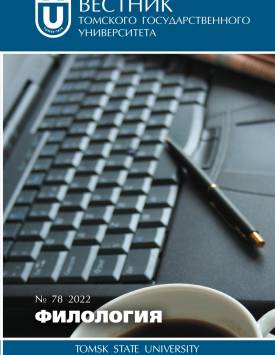The rhythmic structure of a poetic text as an issue of translation studies. Illustrated by the English translation of Marina T svetaeva’s poem “Emigrant” by Christopher Whyte
The article is focused on the issue of rhythm in poetic text and its rendering in translation. The matter of rhythm in poetry has not been solved by theoreticians so far. They are unanimous only in the persuasion that rhythm is closely connected with the content. In the article, Efim Edkind’s list of the elements constituting poetic rhythm become the theoretical basis for the research. The author of the article proceeds on the assumption that the rhythmic pattern of a poetic work is the thing most often neglected by poetry translators. Even if it is not, the effect of rhythmic devices used to create a specific impact might be different in different cultures and depend on the national poetic tradition. Eventually, how to convey the rhythm of a poetic text is one of the major issues for translation studies. The research is based on a comparative analysis of Marina Tsvetaeva’s poem “Emigrant” and its translation into English by Christopher Whyte with a special emphasis on how the transformations on the level of the content correlate with the changes on the level of the rhythm. Tsvetaeva’s poem is selected as an illustration for the theoretical point because she was one of those authors whose rhythmic patterns were diverse and semantically coloured. Using the technique of close reading, the author comes to the conclusions described below. Tsvetaeva in her poem uses the word “emigrant” metaphorically to speak about a poet’s destiny to be an alien among common people (a modification of the theme “poet and crowd” popular in the Russian poetic tradition). She supports the content on the level of the poem’s rhythm with a number of devices to create the intonation very similar to the one used by Mayakovsky in his poems meant to be the slap in the face of petty bourgeois. In the translation, the word “emigrant” is used in its direct sense. The poem tells about the hardships of an emigrant who is doomed to stay alien to the people native to the country. The rhythm of the poem is also changed to create a less sharp, more balanced, meditative intonation which makes the poem sound very much like T. S. Eliot’s “The Love Song of Alfred Prufrock”. Some of the rhythmic devices used by Tsvetaeva are omitted by the translator because they are foreign to contemporary English readers of poetry: rhymes, specific pattern of endings (which creates in the original the sensation of alternate acceleration and slowing down). Other devices, even though they are reproduced in translation, acquire different semantics within the frames of the new culture, i.e. the abundance of enjambements which do not look as innovatively as they did in Tsvetaeva’s poetry. The author declares no conflicts of interests.
Keywords
rhythm, poetry translation, Marina Tsvetaeva, Christopher Whyte, “Emigrant”Authors
| Name | Organization | |
| Tsvetkova Marina V. | National Research University Higher School of Economics | mtsvetkova@hse.ru |
References

The rhythmic structure of a poetic text as an issue of translation studies. Illustrated by the English translation of Marina T svetaeva’s poem “Emigrant” by Christopher Whyte | Vestnik Tomskogo gosudarstvennogo universiteta. Filologiya – Tomsk State University Journal of Philology. 2022. № 78. DOI: 10.17223/19986645/78/9
